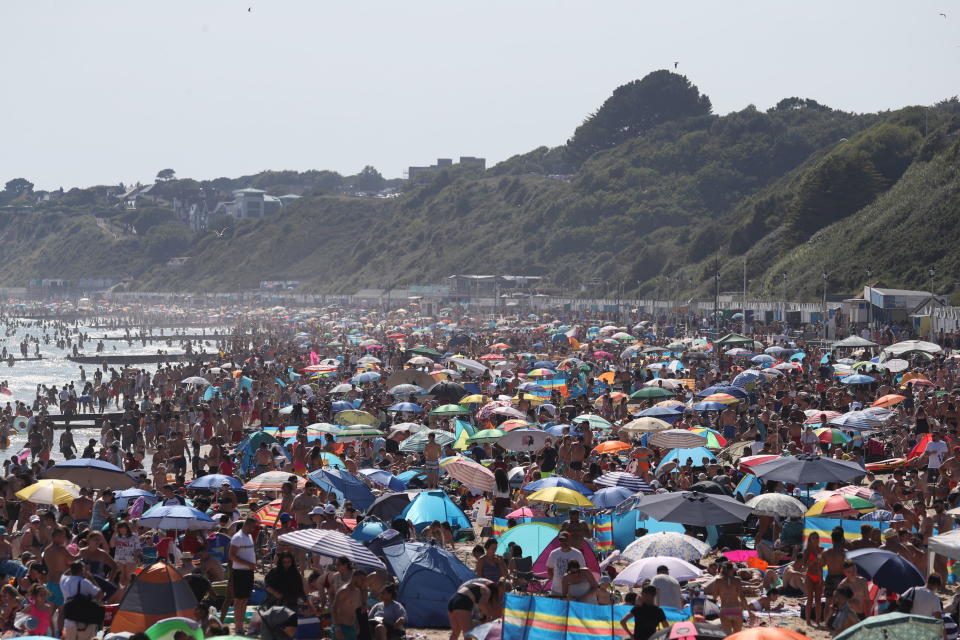'Greatest coronavirus threat to Europe is complacency', warns WHO amid second wave fears

European nations should “not be complacent” about coronavirus as the risk of a second wave remains high, the World Health Organisation has warned.
The continent has experienced high numbers COVID-19 infections, with the UK recording more than 54,000 virus fatalities to date - the third highest virus death toll in the world.
Boris Johnson this week announced a further easing of restrictions in England from 4 July, along with a cut in social distancing from two metres to “one metre plus”.
On Thursday, scenes showed Brits defying social distancing guidelines this week to packed out seaside hot spots such as Brighton and Bournemouth on the hottest day of the year, with temperatures reaching a high of 33.3C.
Now the head of the World Health Organisation (WHO) has warned Europe is still at risk of a second wave of COVID-19.

On Friday, WHO chief Dr Tedros Adhanom Ghebreyesus told the Parliamentary Assembly of the Council of Europe (PACE) that the COVID-19 pandemic was “still accelerating”.
During his opening speech, Dr Tedros said: 'The pandemic is still accelerating.
“In the first month of this outbreak, less than 10 thousand cases were reported to WHO. In the last month, almost 4 million cases have been reported.
“We expect to reach a total of 10 million cases and 500 thousand deaths within the next week.”
The WHO chief warned how nations and individuals should “stay alert” to the virus - despite the easing of social distancing restrictions.
He added: “Although transmission has been suppressed in many European countries, the virus is still circulating, it’s still deadly, and most people are still susceptible.
“This is the time to be on our guard, not to let it down. The greatest threat in Europe now is complacency.”
Bournemouth, Christchurch and Poole council said it was left with no choice but to declare a major incident after services were “completely overstretched” after huge numbers of visitors defied advice to stay away during the hot weather in recent days.
Meanwhile thousands of Liverpool FC fans also flocked to Anfield on Thursday night to celebrate the club winning the Premier League.
On Friday, health secretary Matt Hancock told TalkRadio he was “reluctant” to go down the route of shutting public spaces as “people have had a pretty tough lockdown”.
He warned that if there was a spike in coronavirus cases “then we will take action”.
Meanwhile, England’s chief medical officer, Professor Chris Whitty, urged people to follow social distancing rules in the hot weather or risk causing a spike in coronavirus.
He pleaded on Twitter: “Covid-19 has gone down due to the efforts of everyone but is still in general circulation.
COVID-19 has gone down due to the efforts of everyone but is still in general circulation.
If we do not follow social distancing guidance then cases will rise again. Naturally people will want to enjoy the sun but we need to do so in a way that is safe for all.— Professor Chris Whitty (@CMO_England) June 25, 2020
“If we do not follow social distancing guidance then cases will rise again. Naturally people will want to enjoy the sun but we need to do so in a way that is safe for all.”
After international media reacted with horror to the scenes in England, describing the scenes as “shocking” and “unbelievable”.
French site News 24 reported on the scenes on the south coast under the headline: “Ne jetez pas tout” - “Don’t throw everything away”.

Clarin, the largest tabloid in Argentina, expressed similar sentiments of despair, saying: “Lack of control in Britain: thousands of people invaded the beaches with umbrellas, lounge chairs and beers in the middle of a heat wave”.
Meanwhile, the WHO’s special envoy for Europe, Dr David Nabarro, said some Britons had showed a “real reluctance” to co-operate with the UK government’s contact tracers.
The latest NHS Test and Trace figures this week show that 24% of people (5,062) who tested positive for Covid-19 between May 28 and June 17, and who had been transferred to the tracing system, had not been reached.
Coronavirus: what happened today
Click here to sign up to the latest news, advice and information with our daily Catch-up newsletter
Read more about COVID-19
How to get a coronavirus test if you have symptoms
How easing of lockdown rules affects you
In pictures: How UK school classrooms could look in new normal
How public transport could look after lockdown
How our public spaces will change in the future
Help and advice
Read the full list of official FAQs here
10 tips from the NHS to help deal with anxiety
What to do if you think you have symptoms
How to get help if you've been furloughed

 Yahoo News
Yahoo News 

